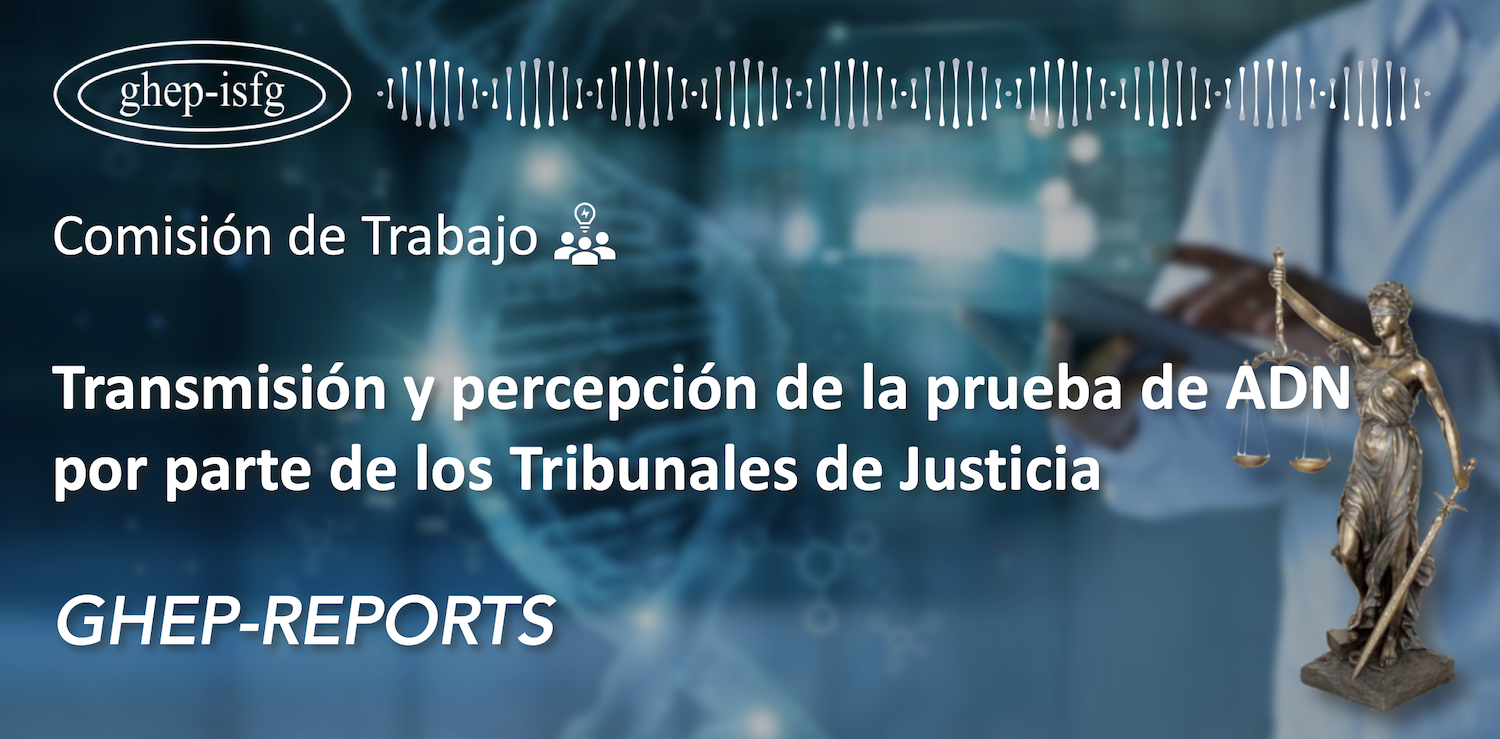GHEP-REPORTS
Working Commission presentations

Introduction
DNA testing is often considered the Gold Standard of Forensic Sciences. However, there is still a wide margin of variation in the way it is interpreted and reported, especially in the case of complex genetic profiles such as mixtures. Already with the GHEP-MIX Working Commission, this disparity in interpretation and approach to mixture profiles was revealed. With this new Working Commission on the “Transmission and perception of DNA evidence by the Courts of Justice” (GHEP-REPORTS) (unanimously approved at the General Assembly on July 28, 2023, in Cartagena de Indias, Colombia), we intend to go one step further, assessing how said transmission of DNA evidence is carried out and what the perception is on the part of the final recipients of our reports, the Courts of Justice.
In 2016, Keijser et al. published an interesting study (Forensic Sci Int: Genet 23:71-82), in which they sought to answer the questions: What type and magnitude of differences were found when forensic DNA experts from different institutes and jurisdictions were given an identical forensic case which they were supposed to report on? And, if the differences were important, what did this mean for jurists' interpretation and value of evidence?
Well, from the recently created GHEP-REPORTS Working Commission, it is believed that it is interesting to reproduce this study in the field of Spanish and Portuguese speaking countries, taking into account their language and cultural differences and, above all, the impact that has on judicial agents, with the legislative particularities of each country.
Objectives
In this way, the objective of this GHEP-ISFG Working Commission is twofold:
- On the one hand, assess how an alleged, relatively complex case is reported by different laboratories in different countries (transmission of the DNA evidence). To do this, as will be detailed in the methodology section, all the laboratories selected in each country will be provided with the same case, with the same analytical results.
- And, on the other hand, assess the perception of the final recipients of these expert reports, the Courts of Justice, regarding different reports of the same case (perception of the DNA evidence). To do this, in each country, at least 2 reports from different laboratories will be selected from the previous ones, with well-differentiated conclusions, which will be provided to various jurists in the criminal field (judges, magistrates, prosecutors and/or lawyers) within each country.
Coordinators and contacts
This Working Commission, given the objectives, apart from general coordination, will have different coordinators depending on the country of application:
General Coordinators and Spain:
Manuel Crespillo Márquez
Pedro A. Barrio Caballero
Coordinator Argentina:
Nidia María Modesti
nmodesti@justiciacordoba.gob.ar
Coordinator Brazil:
Ronaldo Carneiro da Silva Junior
Coordinator Colombia:
Juan J. Yunis
jjy@yunis.com.co // jjy@yunis.co
Coordinator Mexico:
Mariano Guardado-Estrada
Coordinator Portugal:
Lisa Andrade Sampaio
Coordinator Dominican Republic (for different countries of Latin America):
Eileen Riego Trejo
Methodology
As indicated, to undertake this double objective, 2 sequential studies are proposed within each country:
- The coordinators will provide the same case (with the same analytical results) to at least 6 laboratories that work in the field of forensic genetics, analyzing criminal cases, so that they can issue an expert report based on those same results, as they would issue in a real case. Of these, at least 2 expert reports will be selected in each country, whose conclusions are as different as possible from each other, to give a margin of variability to the interpretation and perception that may be had of them.
- These 2-3 reports will be provided to as many judicial actors (judges, magistrates, prosecutors and/or lawyers) as possible, within the different countries, so that they can evaluate these expert reports and issue their conclusions. To do this, they will be provided with the same questionnaire that they must fill out with short answers and/or numerical scales. Likewise, they will be asked to provide 3-5 questions that they would ask at an oral hearing/hearing.
Deadlines
Given the methodology of the proposed study, different deadlines will be established for each of the proposed approaches and/or sub-studies:
- Prepare the practical case, coordinate the different people responsible for the different countries and contact the possible participating laboratories: until mid-October 2023.
- Send the practical case to each of the participating laboratories: October 30, 2023.
- Deadline for laboratories to submit their reports: December 15, 2023.
- Review of all reports and selection of reports to be sent to the Judicial Agents: January 19, 2024.
- Preparation of the questionnaires to send to the Judicial Agents: until February 29, 2024.
- Submission of the selected reports to the Judicial Agents: March 4, 2024.
- Deadline to receive the evaluations from the Judicial Agents: April 12, 2024.
- Evaluation of the results: (pending to be determined)
- Final report: (pending to be determined)
Documents and Results
More information available soon.
As results are obtained, they will appear in this section. Access only for members.
*Practical case.
* Answering questions in oral hearing.
* Reports selected for distribution among Judicial Agents.
- Spain
- Argentina
- Brazil
- Colombia
- Mexico
- Portugal
- Other Latin American countries
* Questionnaire on reporting for Judicial Agents.
- In Spanish
- In Portuguese
*Result of the questionnaire to judicial agents.